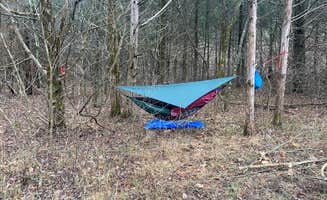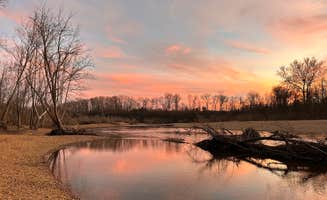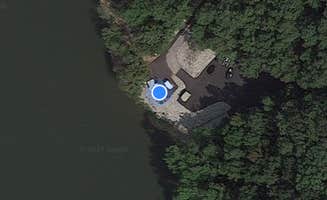Mark Twain National Forest contains several dispersed camping options within 50 miles of Bismarck, Missouri. Most sites sit at elevations between 500-1,300 feet, with terrain characterized by rocky Ozark hills and numerous waterways. Summer temperatures typically range from 75-95°F with high humidity, while spring and fall bring milder conditions with occasional heavy rainfall that can affect access roads.
What to do
Fishing opportunities: Little Scotia Pond offers productive fishing with active wildlife. "Lots of beavers in the pond," notes one camper at Little Scotia Pond 4x4 Dispersed Site. The area has multiple ponds and streams where anglers can catch bass, bluegill, and catfish.
Hiking trails: Several unmarked paths connect dispersed camping areas to longer trail systems. At Big River Primitive Campground, one backpacker shared: "I backpacked 50 miles during spring break on the Ozark Trail between Council Bluff Lake and Johnson Shutins State park." The Ozark Trail sections provide challenging day hikes from most dispersed sites.
Mountain biking: Forest service roads and designated trails offer various riding options. "Miles and miles of trails for Mountain Biking, horse riding or just hiking," reports a visitor to Brazil Creek Camping Area. Riders should bring repair kits as services are limited.
What campers like
Solitude: Many sites provide genuine isolation from other campers. At Murphy Overlook, one visitor experienced: "We were the only people along this forest service road and got the prettiest spot towards the end of the road overlooking the mountain across." Weekday visits particularly guarantee privacy.
Wildlife encounters: The region supports diverse wildlife beyond what's mentioned in common guides. A camper at Sulphur Springs Dispersed reported: "Fireflies and owls into the night. Mist on the water in the morning: just beautiful." Bear awareness remains important as sightings occur occasionally.
Night skies: Minimal light pollution creates excellent stargazing conditions. "Being that far from civilization, there was no light pollution so seeing the stars and getting some night photos is possible," noted one Murphy Overlook visitor, highlighting a benefit of these remote locations.
What you should know
Vehicle requirements: Many dispersed sites require appropriate vehicles. A reviewer at Courtois Creek Dispersed warned: "The road to get there isn't a road so much as a ATV trail. All wheel drive and it was too hard on my Subaru. Mostly washed out." Research access conditions before attempting remote sites.
Water sources: Bring filtration systems for creek and pond water. At Big River Primitive Campground, a camper advised: "Make sure you bring a water purifier. It is some of the best tasting water I have ever had." Carrying extra water remains recommended during dry periods.
Cell service: Connectivity varies dramatically between locations. "No Verizon signal. Bathroom available. Nice secluded area," reports a Brazil Creek camper. Some sites offer carrier-specific reception: "T mobile service has 3 of 4 bars. There is no apparent Verizon service" at Sulphur Springs.
Tips for camping with families
Safer water access: Some areas provide child-friendly water features. "We ended up wanting to be closer to the water and there happened to be a trail," notes a visitor to Little Scotia Pond, where gentle shorelines offer easier supervision.
Animal viewing opportunities: Wildlife encounters create educational experiences. At Julian Tower Lookout, the open area provides good visibility: "There is one two-path logging road suitable for hiking and mountain biking back into the woods," where wildlife spotting chances increase during morning hours.
Safety precautions: Bear activity requires proper food storage. "I saw several deer, a couple beavers in the pond, raccoons, and on the last day a bear and 2 cubs. So keep that in mind," warns a Little Scotia Pond camper, emphasizing the importance of wildlife awareness.
Tips from RVers
Site limitations: Most dispersed areas accommodate smaller setups only. One camper at Little Scotia Pond observed: "A small class c or travel trailer might make it into a few sites, best for vans and tents," highlighting the size restrictions common at free camping near Bismarck.
Turnaround challenges: Limited maneuvering space creates difficulties for trailers. At Murphy Overlook, a camper noted: "Both are very small where only expert drivers can turn around a trailer," making advance planning essential for larger vehicles.
Seasonal access: Spring conditions often worsen road quality. "Road can be a little rough in spots after it rains," reported a visitor to 34 Bridge Recreation Area, suggesting early summer through fall provides the most reliable access for heavier vehicles.





